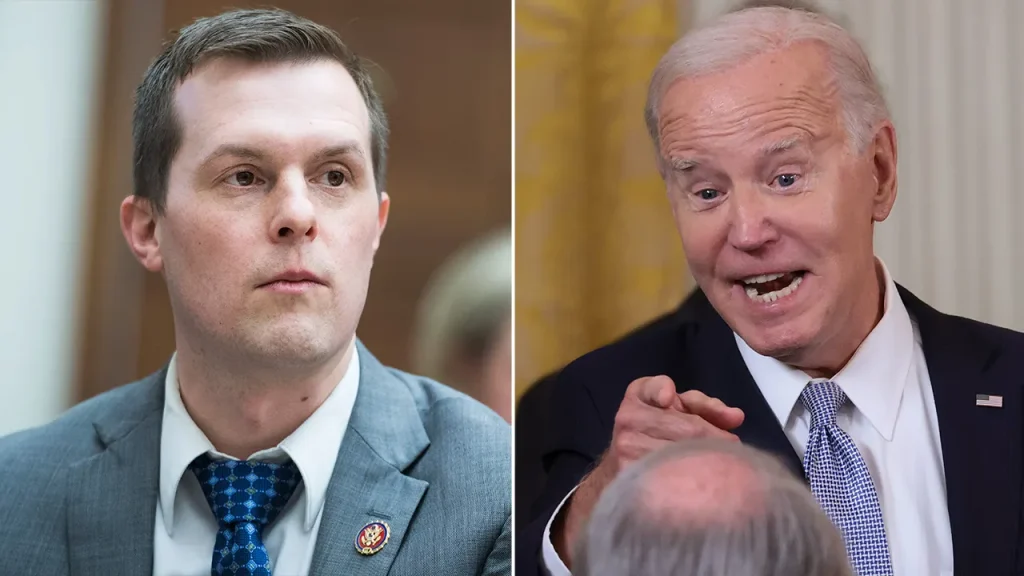In a recent discussion regarding trade policies, Representative Jared Golden from Maine expressed concerns that the Democratic Party is heading in the “wrong” direction. Golden, known for his moderate stance, emphasized the need for a balanced approach to tariffs and trade, advocating for a 10% universal tariff on imports. Despite opposition from many in his party, he believes that such measures could benefit rural communities and working-class individuals affected by longstanding trade practices.
| Article Subheadings |
|---|
| 1) Golden’s Stance on Tariffs |
| 2) The Reaction from the Democratic Party |
| 3) Historical Context of Trade Policies |
| 4) Trump’s Proposed Tariff Plan |
| 5) The Path Forward for American Trade |
Golden’s Stance on Tariffs
In a recent interview, Representative Jared Golden articulated his support for a proposed 10% universal tariff on all U.S. imports, aligning with some of the tariff policies previously advocated by former President Donald Trump. Golden, a Democrat from Maine, highlighted that he has been pushing this tariff legislation, even when similar proposals were dismissed by the broader Democratic caucus. His advocacy reflects a belief that tariffs can protect American jobs and support local economies, particularly in rural areas that have been devastated by the existing trade arrangements.
The Reaction from the Democratic Party
Golden’s perspective, however, has not found widespread acceptance among his Democratic colleagues. He noted that the prevalent sentiment in the party leans towards opposing tariff increases, which they perceive as regressive. Many in the party have reacted strongly against Trump’s tariff policies, viewing them as potential catalysts for trade wars and economic turmoil. Golden expressed disappointment at what he sees as a misalignment within the party regarding trade policies, feeling that the traditional Democratic values of protecting working-class interests are being sidelined in favor of a more confrontational approach.
Historical Context of Trade Policies
Golden emphasized that his concerns about trade policies are not merely reactions to current politics, but rather they are rooted in a historical context that stretches back decades. He recalled how the Democratic Party used to be critical of agreements like the North American Free Trade Agreement (NAFTA) and the World Trade Organization’s policies. He described the party he joined during his formative years as a champion for workers and communities hurt by globalization. This historical lens leads him to argue that the current backlash against tariffs constitutes a drastic pivot away from protecting American labor and communities, especially those that have faced job losses due to unfavorable trade practices.
Trump’s Proposed Tariff Plan
The broader context for Golden’s advocacy comes in light of Trump’s recent proposal, which includes a sweeping 10% tariff on all imports along with potentially reciprocal tariffs that could reach up to 50% for certain nations. Golden expressed his willingness to collaborate with Trump on these tariffs, indicating that both parties could find common ground in reshaping the U.S. trade framework. He acknowledged that while tariffs might offer immediate relief, they must be accompanied by other supportive measures aimed at fortifying American manufacturing capabilities.
The Path Forward for American Trade
Looking ahead, Golden articulated a vision for a balanced and nuanced approach to trade. He stressed that tariffs could only serve as an initial step in addressing longer-standing issues related to free trade. For Golden, the ultimate goal is to create a trade environment that uplifts American families and supports local businesses. This includes advocating for robust support of unions, trades, and apprenticeship programs while reducing regulatory burdens that hinder production. He called for leaders to prioritize strategies that benefit American workers in all sectors and to utilize revenue generated by tariffs to invest in domestic manufacturing.
| No. | Key Points |
|---|---|
| 1 | Rep. Jared Golden supports a 10% universal tariff on imports. |
| 2 | His views on tariffs have not gained popularity among fellow Democrats. |
| 3 | Golden emphasizes historical Democratic values advocating for worker protections. |
| 4 | Trump’s proposed tariffs include a 10% blanket tax and higher tariffs for allies and adversaries. |
| 5 | Golden advocates for a collaborative approach to trade that supports American workers. |
Summary
The ongoing debate over tariffs and trade policy seeks to reconcile differing views within the Democratic Party as Representative Jared Golden advocates for a return to more protective measures for American workers. His support for tariffs, primarily aimed at protecting local economies, has sparked significant discussion regarding the appropriate direction for the party. As the political landscape continues to evolve, achieving a consensus on trade will be crucial for addressing the needs of constituents who have borne the brunt of globalization and unregulated trade practices.
Frequently Asked Questions
Question: What are tariffs, and why are they significant?
Tariffs are taxes imposed on imported goods and services, typically used by governments to generate revenue or protect domestic industries from foreign competition. They hold significant importance in shaping trade policies and can impact prices, local economies, and international relations.
Question: How do tariffs affect working-class communities?
Tariffs can provide a temporary buffer for working-class communities by making imported goods more expensive, thus encouraging consumers to purchase domestically produced products. However, they can also incite trade retaliations, potentially harming the industries that depend on imported goods.
Question: What role does Representative Golden envision for tariffs in future trade discussions?
Representative Jared Golden sees tariffs as a necessary starting point for addressing longstanding imbalances in trade policies. He believes they should be paired with comprehensive measures that support manufacturing, strong labor protections, and strategic economic investments to ensure that they ultimately benefit American families and workers.


